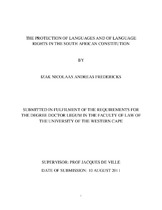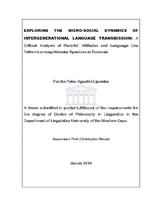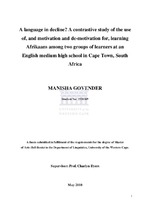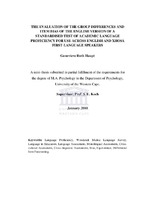The protection of languages and of language rights in the South African constitution
Abstract
The 1996 South African Constitution contains a number of provisions that deal specifically with the protection of languages and of rights relating to language. The most important of these is section 6 which recognises 11 languages as official languages. This recognition is in line with recent developments in international law where common standards in relation to the protection of minority languages are in the process of being developed. The recognition of multilingualism as well as its implementation is thus becoming an obligation resting on all states, including South Africa. International law shows that persons belonging to linguistic minorities are entitled not only to protection against discrimination based on the language they speak, that is, formal equality, but also to positive state action in order to ensure their substantive equality. International law furthermore prescribes that where protection is given to minority languages, the principle of proportionality must guide states, and that legislation needs to be sufficiently detailed in bringing about such protection. The present thesis has as its main aims the interpretation of the provisions of the 1996 Constitution, in accordance with the above-mentioned international standards and the evaluation of the extent to which South African has complied with its constitutional obligations. The thesis in addition makes proposals in relation to what needs to be done to comply with such obligations. This is done in respect of the three levels of government - national, provincial and local - as well as the three state branches - the legislature, the executive and the judiciary. In addition, the implementation of the constitutional requirements in the educational sector is analysed.The thesis shows that a number of steps have thus far been taken in the process of giving effect to the relevant provisions of the Constitution. This includes the adoption of language policies on the national, provincial and local levels, as well as the enactment of language legislation in some provinces. In many provinces as well as municipalities, little effort has however been made to comply with these constitutional obligations. On the national level, much likewise still remains to be done in this regard. The current South African Languages Bill (2011) only caters for the activities of the national government, and does so in a way which conflicts with international norms. The Bill does not deal with parliament or the courts, and much uncertainty remains about the way in which the Constitution is to be given effect to in relation to these state branches. In relation to education, the issue of single-medium schools has been controversial, but has now been resolved by the Constitutional Court. Commendable policies have furthermore been adopted to provide for mother-tongue education, but it appears that English is slowly becoming the dominant language in education, at the expense of mother-tongue instruction.
Related items
Showing items related by title, author, creator and subject.
-
Exploring the micro-social dynamics of intergenerational language transmission: a critical analysis of parents's attitudes and language use patterns among Ndamba speakers in Tanzania
Lipembe, Pembe Peter Agustini (University of the Western Cape, 2010)The study has several implications; for general theoretical traditions it highlights the point that ambivalent attitudes and incomplete language use are responsible for gradual language decline. Previous studies while ... -
A language in decline ? :a constrastive study of the use of, and motivation and de-motivation for, learning Afrikaans among two groups of learners at an English medium high school in Cape Town, South Africa
Govender, Manisha (University of the Western Cape, 2010)Afrikaans in practice replaced Dutch and became one of South Africa's official languages (along with English) from 1925. It reached the apex of its development and influence during the years of Nationalist party rule and ... -
The evaluation of the group differences and item bias of the English version of a standardised test of academic language proficiency for use across English and Xhosa first-language speakers
Haupt, Genevieve Ruth (University of the Western Cape, 2010)South Africa's Language-in-Education Policy is one of additive multilingualism, but in reality this policy is not adhered to, in that most black children are being educated through the medium of English from Grade 4. This ...




